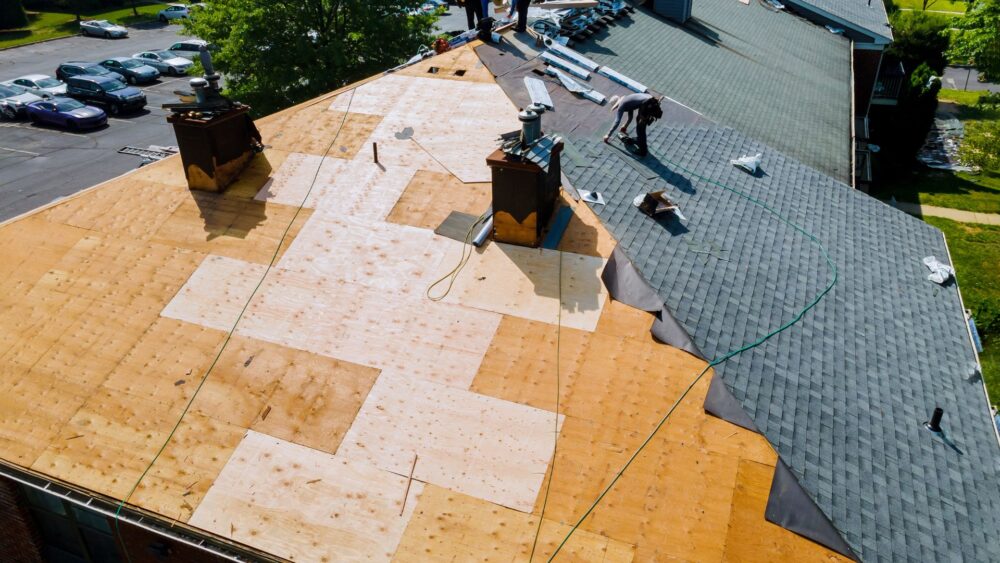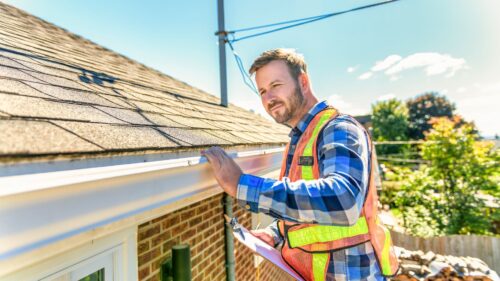Roofing warranties might not be the talk of the town, but they sure are a cornerstone for peace of mind when it comes to protecting one of your biggest investments – your home. With an average ROI sitting pretty at 3800%, overlooking this aspect could mean missing out on crucial benefits that keep you covered against unforeseen damages. But with so many options out there, finding the right warranty can feel like searching for a needle in a haystack.
So, whether you’re about to embark on roof replacement or simply brushing up on ways to safeguard your abode, understanding what roofing warranties offer is key. Let’s break down what these warranties cover, their limitations, and how they stand as silent guardians over our heads.
Roofing warranties are like a safety net for your home. They’re there to catch you if something goes wrong with your roof.
But let’s be real, most of us don’t even know what they cover or how to choose the right one. It’s time to change that.
Understanding the Importance of Roofing Warranties
A roofing warranty is like an insurance policy for your roof. This handy feature saves you from digging into your wallet for repairs or new replacements if things go south due to defects or shoddy craftsmanship.
Without a warranty, you could be on the hook for thousands of dollars if something goes wrong. And believe me when I say, you don’t want to mess with roofing issues.
How to Choose the Right Warranty for Your Roof
Not all roofing warranties are created equal. Some only cover materials, while others include labor and workmanship.
When choosing a warranty, consider the length of coverage, what’s included (and excluded), and the reputation of the manufacturer and contractor. Don’t just go for the cheapest option – investing in a solid warranty can save you big bucks down the line.
Roofing warranties come in all shapes and sizes. Let’s break down the most common types so you know what you’re getting into.
Workmanship Warranty: What You Need to Know
A workmanship warranty covers any issues caused by improper installation or poor craftsmanship. This is provided by your roofing contractor and typically lasts 1-5 years.
Make sure your contractor offers a solid workmanship warranty – it’s your first line of defense against leaks and other problems.
Manufacturer’s Warranty: An In-depth Look
A manufacturer’s warranty covers defects in the roofing materials themselves. This usually includes shingles, underlayment, and other components.
Most manufacturer’s warranties are prorated, meaning the coverage amount decreases over time. Be sure to read the fine print and understand what’s covered and for how long.
Extended and Transferable Warranties: A Closer Look
Some manufacturers offer extended warranties that provide coverage beyond the standard term. These often require using all components from that manufacturer and meeting specific installation requirements.
Transferable warranties can be passed on to a new owner if you sell your home, which can be a great selling point. Just make sure to follow the proper transfer procedures to keep the coverage intact.
A roofing warranty is like a superhero cape for your roof. So, think of it as your personal superhero, guarding against the pesky problems that roofs can throw at you. So, you might be wondering, what’s it actually protecting you from?
Coverage Details for Material Defects
Most roofing warranties cover defects in the materials, like shingles that crack, curl, or blow off in the wind. This is where the manufacturer steps in to save the day.
Keep in mind that coverage for material defects is usually prorated. So the older your roof gets, the less the manufacturer will pay out for repairs or replacements.
Coverage Scope for Installation Errors
Installation errors are like the kryptonite of roofing. These little troublemakers can chip away at your roof’s armor, opening the door for leaks and a bunch of other headaches.
That’s where workmanship warranties come in. They cover problems caused by improper installation, like shingles that are nailed incorrectly or flashing that’s not sealed properly.
Just remember that workmanship warranties are typically shorter than material warranties. And they may have some exclusions, like damage from severe weather or lack of maintenance.
It’s important to know what’s not covered so you don’t get caught off guard.
Common Exclusions in Standard Warranties
Most standard roofing warranties exclude damage from things like hail, high winds, and falling objects. They also won’t cover issues caused by improper roof maintenance or modifications.
So if you decide to install a satellite dish or solar panels on your roof, you could be voiding your warranty coverage. Always check with your manufacturer and contractor before making any changes.
Limitations Based on Specific Materials Used
Different roofing materials have different warranty limitations. For example, asphalt shingle warranties are often prorated, while metal roof warranties may have longer, more comprehensive coverage.
Natural materials like cedar shake or slate may not have manufacturer warranties at all, since they’re not produced by a specific company. In these cases, your protection comes from the contractor’s workmanship warranty.
Your roof warranty is like a plant – it needs some TLC to keep it alive and well. So, to keep your coverage from fizzling out, here are a few handy tricks.
The Importance of Regular Inspections
Regular roof inspections are like checkups for your warranty. They’re like your early warning system, catching the little hiccups before they blow up into big headaches that might just put your coverage in jeopardy.
Most manufacturers require annual or semi-annual inspections to keep your warranty valid. So schedule those check-ups and keep records of all maintenance and repairs.
Staying with Your Original Contractor
Switching contractors for repairs or modifications can sometimes void your workmanship warranty. It’s like cheating on your roofer – it can come back to bite you.
Whenever possible, stick with the contractor who installed your roof. They know your roof best and have a vested interest in keeping your warranty intact.
Registering Your Warranty: Why It Matters
Registering your warranty is like putting a ring on it – it makes your commitment official. Most manufacturers require you to register your warranty within a certain timeframe after installation.
If you don’t register, you could lose out on coverage or have a harder time filing a claim. So don’t let that paperwork gather dust – fill it out and send it in ASAP.
When it comes to roofing warranties, not all manufacturers are created equal. Here’s a quick rundown of what the big names in the biz have to offer.
GAF and Owens Corning Shingles Warranties Coverage
GAF offers several tiers of shingle warranties, from basic 10-year coverage to a lifetime limited warranty on their top-of-the-line shingles. Their Golden Pledge warranty even includes 25 years of workmanship coverage when you use a GAF-certified contractor.
Owens Corning also has a range of warranties, with their Preferred Protection Roofing System warranty providing lifetime coverage for materials and workmanship. Just make sure your contractor is part of their Preferred Contractor network.
Asphalt Shingle Warranties from Top Manufacturers
Most asphalt shingle warranties from leading manufacturers are pretty similar. They typically include a lifetime limited warranty against manufacturing defects, with prorated coverage after the first 10-20 years.
Some warranties, like the GAF System Plus or CertainTeed SureStart PLUS, also offer extended coverage for labor and disposal costs. Just remember that you’ll need to use all components from that manufacturer to qualify for these beefed-up warranties.
Roofing Warranties FAQs:
What is the usual warranty on a new roof?
New roofs typically come with a 20 to 50-year warranty, depending on materials and manufacturer.
Are roofing warranties worth it?
Absolutely. They protect your investment from defects and installation mishaps, saving you money long-term.
What does a 30 year shingle warranty cover?
This covers manufacturing defects in shingles for up to 30 years but read the fine print for specifics.
Who has the best roof shingle warranty?
GAF and Owens Corning lead the pack with comprehensive coverage options for asphalt shingles.
Conclusion
The truth laid bare; roofing warranties aren’t just another piece of paper tucked away in some dusty drawer – far from it. In essence, knowing all about roofing warranties, their covers and caveats turns each homeowner into an informed guardian over their domain – vigilant yet reassured that come rain or shine (or hail), the shield above remains steadfastly reliable. Find a roofing contractor today by filling out this form.



